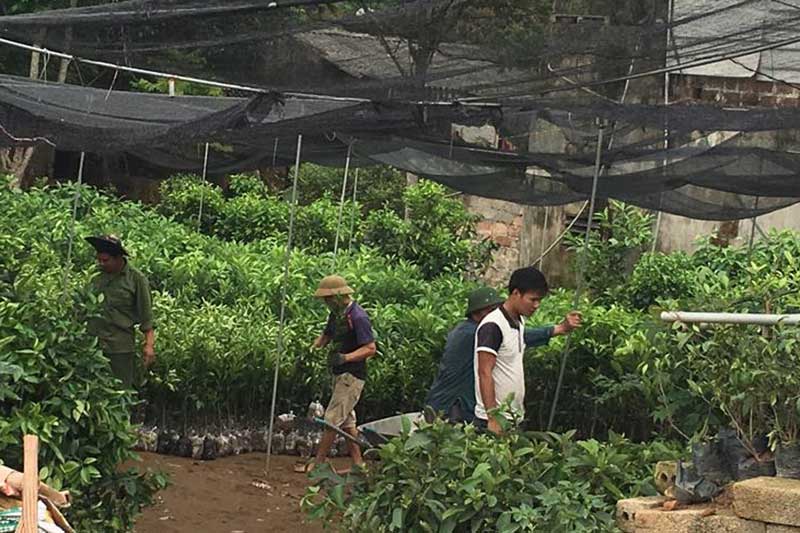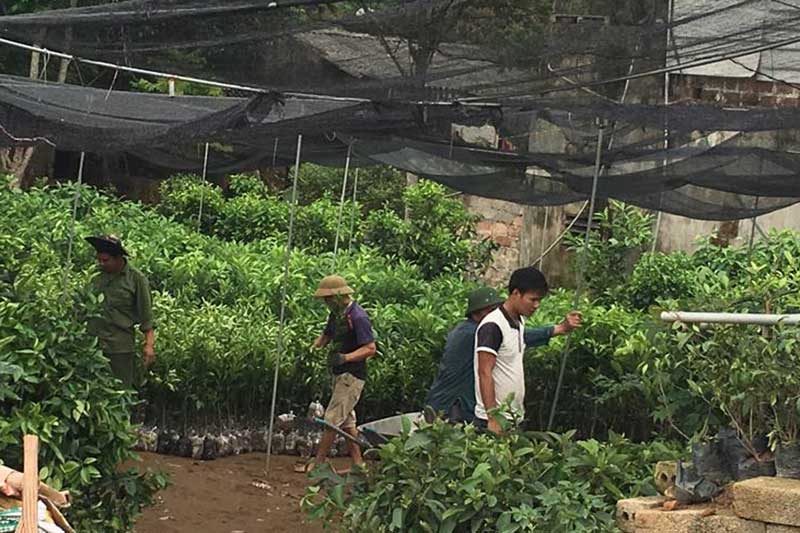
(HBO) - With the large area of growing sugarcane, fruit trees, excluding the area of rice and maize, Cao Phong district attaches importance to the control of "input" agricultural materials, determining this as a key problem to ensure the quality and safety of agricultural products.
At present, there are 68 establishments of
running agricultural product business. Every year, 100% of these establishments
are inspected, 100% of the establishments are evaluated and classified by
decentralization. In 2017, 58 establishments were inspected, 10 of which were
not inspected because 3 out of 10 establishments were managed by the province
and 7 out of 10 establishments were not in operation. Specifically, 13
establishments were handled the fine dealt with violations of the law, paying
VND 22.5 million to the state budget. At the same time, the decision was made
to temporarily stop the operation of agricultural product business to two
outlets of selling fruit seedlings in a long time in Cao Phong town and Dong
Phong commune, two pesticide shops in Cao Phong town and Tan Phong commune.

Seedling production firm of Nguyen Duy Hung
in Cao Phong town (Cao Phong)
The work of quality inspection and management
of agricultural products focuses on the business fields of citrus fruit,
perennial fruit trees, pesticide business, organic fertilizer and animal
husbandry food, producing, processing and trading of agricultural products and
veterinary medicines. The violations detected mainly do not have certificates
of eligibility for business or trading of goods with unclear origin, not at the
right places indicated in the business registration certificates.
The establishments that make minor errors,
even heavy errors in inspection, assessment and classification, shall be
reminded, propagated and mobilized to well implement the regulations of law.
Mr. Bui Van Dong, Deputy Director of the
district Board of Agriculture and Rural Development, said: "With the close
coordination and collaboration of all the departments, committees, professional
branches and people's committees of communes and towns, the task of managing
the quality of agriculture, forestry and fishery products and safety in the
area have many advantages. In the last 3 years, there has been no cases of
trading and selling fake agricultural products in the area, timely detecting,
stopping and strictly dealing with violations, contributing to ensuring the
quality of "input" fertilizers, pesticides, veterinary medicines,
creating safe agricultural products, enhancing the value and protecting the
prestige and brand names of products that have been well known, such as Cao
Phong oranges, Cao Phong purple sugar-canes.
According to data from the Hoa Binh Provincial Party Committee, the industrial production index for the first six months of 2025 is estimated to have increased by 20% compared to the same period last year. This marks the highest year-on-year growth rate for this period since 2020.
In the first six months of 2025, Hoa Binh province’s export turnover was estimated at 1.145 billion USD, marking an 18.11% increase compared to the same period in 2024. Import turnover was estimated at $ 804 million, a 17.15% increase, which helped the province maintain a positive trade balance.
The lives of the ethnic minority farmers in Tan Lac district have gradually improved thanks to the new directions in agricultural production. This is a testament to the collective strength fostered through the professional associations and groups implemented by various levels of the district’s Farmers’ Union.
With the motto the "product quality comes first,” after nearly one year of establishment and operation, Muong village’s Clean Food Agricultural and Commercial Cooperative, located in Cau Hamlet, Hung Son Commune (Kim Boi district), has launched reputable, high-quality agricultural products to the market that are well-received by consumers. The products such as Muong village’s pork sausage, salt-cured chicken, and salt-cured pork hocks have gradually carved out a place in the market and they are on the path to obtaining the OCOP certification.
In the past, the phrase "bumper harvest, rock-bottom prices" was a familiar refrain for Vietnamese farmers engaged in fragmented, small-scale agriculture. But today, a new spirit is emerging across rural areas of Hoa Binh province - one of collaboration, organisation, and collective economic models that provide a stable foundation for production.
Maintaining growing area codes and packing facility codes in accordance with regulations is a mandatory requirement for agricultural products to be eligible for export. Recently, the Department of Agriculture and Environment of Hoa Binh province has intensified technical supervision of designated farming areas and packing facilities to safeguard the "green passport" that enables its products to access international markets.



